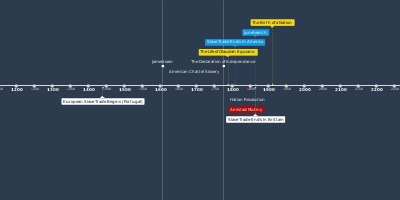26 Feb 1965 Jahr - Murder of Jimmie Lee Jackson
Beschreibung:
(December 16, 1938 – February 26, 1965)Jimmie Lee Jackson was an African American veteran and civil rights activist in Marion, Alabama and a deacon in the Baptist church. On February 18, 1965, while unarmed and participating in a peaceful voting rights march in his city, he was beaten by troopers and fatally shot by an Alabama state trooper. Jackson died eight days later in the hospital.
His death helped inspire the Selma to Montgomery marches in March 1965, a major event in the civil rights movement that helped gain congressional passage of the Voting Rights Act of 1965. This opened the door to millions of African Americans being able to vote again in Alabama and across the South, regaining participation as citizens in the political system for the first time since the turn of the 20th century. Most had been disenfranchised since then by state constitutions and discriminatory practices that made voter registration and voting more difficult.
In 2005, former Alabama State Trooper James Bonard Fowler admitted that he had shot Jackson, in what he said was self-defense soon after street lights had gone out and a melee had broken out. Former trooper Fowler was indicted in 2007 in Jackson's death. In 2010 he pleaded guilty to manslaughter. He was sentenced to six months in prison.
Two memorial services were held for Jimmie Lee Jackson. Martin Luther King, Jr. spoke at one, saying,
"Jimmie Lee Jackson’s death says to us that we must work passionately and unrelentingly to make the American dream a reality. His death must prove that unmerited suffering does not go unredeemed. We must not be bitter and we must not harbor ideas of retaliating with violence. We must not lose faith in our white brothers."
As a result of Jackson's death and other violence, James Bevel, SCLC Director of Direct Action and the director of SCLC's Selma Voting Rights Movement, initiated and organized the first of the Selma to Montgomery marches. It was a way for citizens of Marion and Selma to direct their anger over Jackson's death and work for a positive outcome. It also was called to publicize the effort to gain voters' registration reform.
Held a few days later on March 7, 1965, the march became known as "Bloody Sunday" because of the violent response of state troopers and the county sheriff's posse, who attacked and beat the protesters after they walked over the Edmund Pettus Bridge, leaving the city of Selma and entering the county. The events were widely covered and attracted international attention, raising widespread support for the voting rights campaign. The federal government committed itself to protect the marchers.
Zugefügt zum Band der Zeit:
Datum:
26 Feb 1965 Jahr
Jetzt
~ 60 years ago
